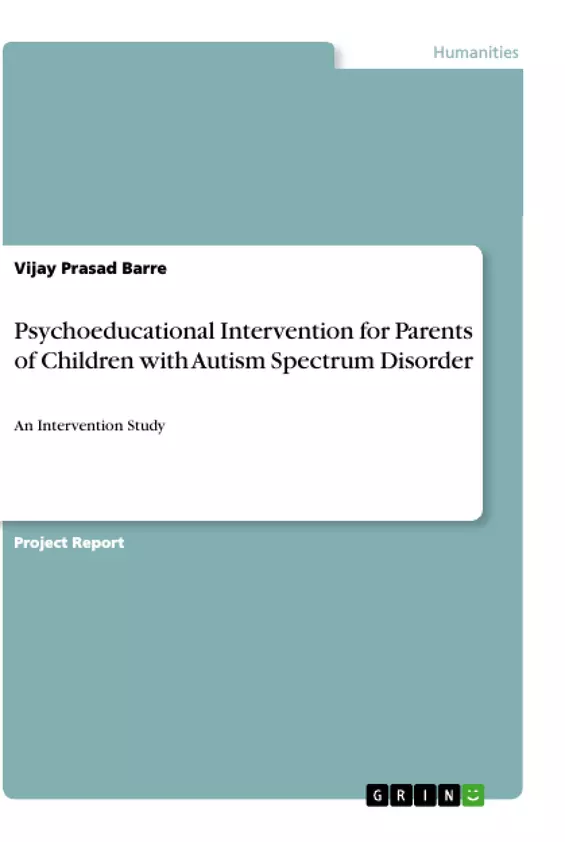The objective of the study was to test the efficacy of psychoeducational intervention in dispelling the misconceptions and in meeting certain needs of the parents of children with Autism Spectrum Disorders (ASD‟s) and the sample consisted of fifteen (15) parents who had children with ASD. The Investigator was identified the parent's needs and then disseminated information regarding autistic condition in accordance with the identified needs.
The intervention was conducted in four sessions for a period of 30 days and one hour per session followed by post assessment. Significant results were found between pre- and post-assessment indicating the beneficial effect of psychoeducational intervention for parents of children with ASD‟s. The findings were revealed that the parent training helped in dispelling the parents' misconceptions, satisfied their information needs and their child condition.
Inhaltsverzeichnis (Table of Contents)
- CHAPTER-I Introduction
- 1.1 History.
- 1.2 Classification of Autism
- 1.3 Characteristics of Autism Disorder
- 1.4 Incidence and Prevalence ..
- 1.5 Causes.....
- 1.6 Assessment Of Autism .......
- 1.7 Services For People With Autism:.
- 1.8 Functions of Psychoeducational Intervention
- 1.9 The advantages of Training Parents as Co- Therapists:
- 1.10 Rationale for the Parent Training.....
- CHAPTER-2 Review of Literature..........\n
- 2.1 Origin of pschoeducational intervention
- 2.2 The Need for Psychoeducation ........
- 2.3 Studies Related to Misconception Regarding the Concept of Autism\nSpectrum Disorders...........
- 2.4 Studies related to effectiveness of Psychoeducational Interventions ........
- 2.5 Review of literature - major findings
- 2.6 Need for the Present Study.\n
- Chapter - 3 Present Study.....
- 3.1 Aim of the Study.
- 3.2 Objectives.......
- 3.3 Hypotheses
- 3.4 Operational Definitions.
- 3.5 Methodology.....
- 3.6 Research Design.......
- 3.7. Description Of The Tools............
- 3.8 Data Collection and Procedure...\n
- 3.9 Analysis of the Data
- 3.10 Ethical Issues
- Chapter 4 Results and Discussion.
- 4.1 Effectiveness of Pre – Post Psychoeducational Intervention on measures\nof two tools
- 4.2 Effectiveness of Pre – Post Psychoeducational Intervention Programme on\nUsing Autism Misconception Scale (Ams)
- 4.3 Effectiveness of Pre - Post Psychoeducational Intervention Programme on\nusing Family Needs Schedule (FAMNS) ….………………………..\n
- 4.4 Effectiveness of Pre-Post Psychoeducational Intervention Different Areas\nof Needs on Measures of (FAMNS) ......
- Chapter-5 Summary and Conclusion
- 5.1 Aim of the Study..\n
- 5.2 Hypotheses
- 5.3 Sample .....
- 5.4 Tools & Intervention
- 5.5 Significant Results of the Study.
- 5.6 Limitations.
- 5.7 Suggestions.....
- 5.8 Conclusion......\n
Zielsetzung und Themenschwerpunkte (Objectives and Key Themes)
This work explores the use of psychoeducational interventions for parents of children with autism spectrum disorder (ASD). The primary goal is to examine the effectiveness of a structured psychoeducational intervention program designed to address parental misconceptions about ASD and to enhance their understanding of their child's needs.
- The impact of psychoeducational interventions on parents' understanding of ASD.
- The effectiveness of psychoeducational interventions in addressing parental misconceptions about ASD.
- The role of psychoeducational interventions in improving parental coping strategies and skills.
- The importance of parent training as a crucial component of comprehensive support for children with ASD.
- The influence of psychoeducational interventions on the family's overall well-being and quality of life.
Zusammenfassung der Kapitel (Chapter Summaries)
The introduction provides a historical overview of autism spectrum disorder (ASD), tracing its recognition and classification. It outlines key characteristics, prevalence rates, and potential causes. The chapter also explores the importance of early detection and intervention, highlighting the role of psychoeducational interventions for parents.
Chapter 2 delves into the existing literature on psychoeducational interventions for parents of children with ASD. It examines the origins of this approach, the rationale for its implementation, and key studies demonstrating its effectiveness. The chapter also addresses common misconceptions about ASD and the need for accurate information and support.
Chapter 3 presents the methodology of the present study. It outlines the specific aims, objectives, and hypotheses of the research. The chapter also provides detailed information on the research design, the tools used to measure outcomes, and the data collection and analysis procedures.
Chapter 4 presents the results and discussion of the study. This chapter examines the effectiveness of the psychoeducational intervention program in addressing parental misconceptions about ASD and in enhancing their understanding of their child's needs. The chapter analyzes the data collected through pre- and post-intervention assessments, and it explores the significant findings of the research.
Schlüsselwörter (Keywords)
The primary focus of this work is on psychoeducational interventions for parents of children with autism spectrum disorder. Key terms include: autism spectrum disorder (ASD), parental misconceptions, psychoeducational interventions, parent training, family needs, coping strategies, and quality of life.
- Arbeit zitieren
- Dr. Vijay Prasad Barre (Autor:in), 2006, Psychoeducational Intervention for Parents of Children with Autism Spectrum Disorder, München, GRIN Verlag, https://www.grin.com/document/512159



